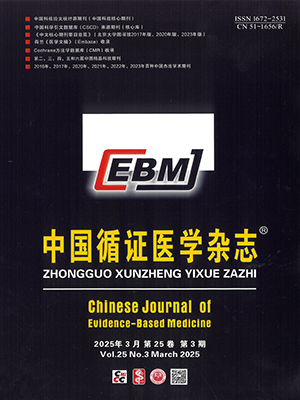| 1. |
王少石, 周新雨, 朱春燕. 卒中后抑郁临床实践的中国专家共识. 中国卒中杂志, 2016, 11(8): 685-693.
|
| 2. |
Hackett ML, Pickles K. Part I: frequency of depression after stroke: an updated systematic review and meta-analysis of observational studies. Int J Stroke, 2014, 9(8): 1017-1025.
|
| 3. |
Ayerbe L, Ayis S, Wolfe CD, et al. Natural history, predictors and outcomes of depression after stroke: systematic review and meta-analysis. Br J Psychiatry, 2013, 202(1): 14-21.
|
| 4. |
Xu JH, Jiang P. Efficacy of escitalopram oxalate for patients with post-stroke depression. Medicine (Baltimore), 2018, 97(14): e0219.
|
| 5. |
脑卒中患者临床神经功能缺损程度评分标准(1995). 中华神经科杂志, 1996, (6): 62-64.
|
| 6. |
American Psychiatric Association. Diagnostic and statistical manual of mental disorders, 4th edition, DSM-Ⅳ. Washington, DC: APA, 1994.
|
| 7. |
American Psychiatric Association. Diagnostic and statistical manual of mental disorders, 3th edition, DSM-Ⅲ-R. Washington, DC: APA, 1987.
|
| 8. |
世界卫生组织. 精神与行为障碍分类: 研究用诊断标准. 刘平, 许又新(译). 北京: 人民卫生出版社, 1995: 138-139.
|
| 9. |
中华医学会精神科学会, 南京医科大学脑科医院. 中国精神疾病分类方案与诊断标准. 南京: 东南大学出版社, 1995: 107.
|
| 10. |
中华医学会精神病学分会. 中国精神障碍分类与诊断标准第三版(精神障碍分类). 中华精神科杂志, 2001, 34(3): 184-188.
|
| 11. |
Hamilton M. A rating scale for depression. J Neurol Neurosurg Psychiatry, 1960, 23: 56-62.
|
| 12. |
Zigmond AS, Snaith RP. The hospital anxiety and depression scale. Acta Psychiatr Scand, 1983, 67(6): 361-370.
|
| 13. |
Montgomery SA, Asberg M. A new depression scale designed to be sensitive to change. Br J Psychiatry, 1979, 134(6): 382-389.
|
| 14. |
Higgins JPT, Green S. Assessing risk of bias in included studies: Cochrane handbook for systematic reviews of interventions 5.1.0. The Cochrane Collaboration, 2011, Available at: www.cochranehandbook.org.
|
| 15. |
Higgins JP, Thompson SG. Quantifying heterogeneity in a meta-analysis. Stat Med, 2002, 21(11): 1539-1558.
|
| 16. |
Jorge RE, Acion L, Moser D, et al. Escitalopram and enhancement of cognitive recovery following stroke. Arch Gen Psychiatry, 2010, 67(2): 187-196.
|
| 17. |
Mikami K, Jorge RE, Moser DJ, et al. Prevention of poststroke apathy using escitalopram or problem-solving therapy. Am J Geriatr Psychiatry, 2013, 21(9): 855-862.
|
| 18. |
Robinson RG, Jorge RE, Long J. Prevention of poststroke mortality using problem-solving therapy or escitalopram. Am J Geriatr Psychiatry, 2017, 25(5): 512-519.
|
| 19. |
Robinson RG, Jorge RE, Moser DJ, et al. Escitalopram and problem-solving therapy for prevention of poststroke depression: a randomized controlled trial. JAMA, 2008, 299(20): 2391-2400.
|
| 20. |
Kim JS, Lee EJ, Chang DI, et al. Efficacy of early administration of escitalopram on depressive and emotional symptoms and neurological dysfunction after stroke: a multicentre, double-blind, randomised, placebo-controlled study. Lancet Psychiatry, 2017, 4(1): 33-41.
|
| 21. |
赵新慧, 温进哲, 袁芳. 草酸艾司西酞普兰预防卒中后抑郁的临床观察. 现代药物与临床, 2014, 29(3): 269-272.
|
| 22. |
Sánchez C, Bøgesø KP, Ebert B, et al. Escitalopram versus citalopram: the surprising role of the R-enantiomer. Psychopharmacology (Berl), 2004, 174(2): 163-176.
|
| 23. |
Caeiro L, Ferro JM, Pinho E Melo T, et al. Post-stroke apathy: an exploratory longitudinal study. Cerebrovasc Dis, 2013, 35(6): 507-513.
|
| 24. |
费鹏鸽, 李丽平, 宋景贵. 氟西汀治疗脑卒中后抑郁疗效的Meta分析. 中国实用神经疾病杂志, 2016, 19(11): 1-3.
|
| 25. |
王娟, 何超, 余雨. 舍曲林治疗卒中后抑郁的Meta分析. 重庆医学, 2016, 45(22): 3100-3103, 3111.
|
| 26. |
阳中明. 米氮平治疗脑卒中后抑郁对照研究的Meta分析. 临床合理用药杂志, 2013, 6(12): 3-4.
|
| 27. |
韩琳, 陈宁, 何俐. 抗抑郁药预防卒中后抑郁有效性的Meta分析. 中国循证医学杂志, 2015, 15(10): 1153-1160.
|
| 28. |
House A. Escitalopram may improve some cognitive functions after stroke in non-depressed patients. Evid Based Ment Health, 2010, 13(3): 81.
|
| 29. |
Gu SC, Wang CD. Early selective serotonin reuptake inhibitors for recovery after stroke: a meta-analysis and trial sequential analysis. J Stroke Cerebrovasc Dis, 2018, 27(5): 1178-1189.
|
| 30. |
Hackett ML, Anderson CS, House AO, et al. Management of depression after stroke: a systematic review of pharmacological therapies. Stroke, 2005, 36(5): 1092-1097.
|
| 31. |
Palomäki H, Kaste M, Berg A, et al. Prevention of poststroke depression: 1 year randomised placebo controlled double blind trial of mianserin with 6 month follow up after therapy. J Neurol Neurosurg Psychiatry, 1999, 66(4): 490-494.
|
| 32. |
Narushima K, Kosier JT, Robinson RG. Preventing poststroke depression: a 12-week double-blind randomized treatment trial and 21-month follow-up. J Nerv Ment Dis, 2002, 190(5): 296-303.
|
| 33. |
王同显, 于瑞宝, 乔显森. 选择性血清素再摄取抑制剂类抗抑郁药物相关出血风险. 中国输血杂志, 2014, 27(4): 448-451.
|
| 34. |
Quinn GR, Singer DE, Chang Y, et al. Effect of selective serotonin reuptake inhibitors on bleeding risk in patients with atrial fibrillation taking warfarin. Am J Cardiol, 2014, 114(4): 583-586.
|
| 35. |
Sayal KS, Duncan-McConnell DA, McConnell HW, et al. Psychotropic interactions with warfarin. Acta Psychiatr Scand, 2000, 102(4): 250-255.
|




